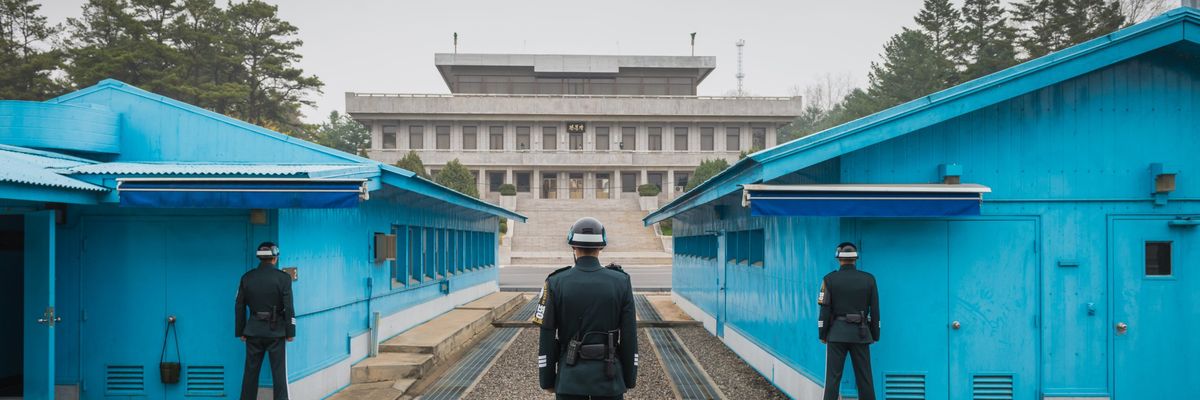A formal peace treaty in the 70-year Korean War has so far proven elusive, with South Korean President Moon Jae-In’s latest call for an-end-of war declaration falling on deaf ears in the United States — which remains the most pivotal party to the conflict.
Despite the 2018 pledge by President Trump and Chairman Kim Jong-Un to establish a “lasting and robust peace regime on the Korean Peninsula,” U.S. policy toward North Korea continues to focus on boxing in the nation militarily, maintaining , and conditioning peace on the full surrender of Pyongyang’s nuclear capabilities.
This approach is based on the belief that the United States can force North Korea to give up its nuclear deterrent while Washington fails to take simultaneous measures to improve bilateral relations and continues to maintain an overwhelming regional nuclear and conventional military presence. While Trump’s North Korea policy fell short of making substantive progress toward peace, many are now concerned that Biden’s history as a North Korea hawk will compel him to return to the failed Obama policy of “strategic patience.”
This approach relied on isolating North Korea and subjecting it to a punishing economic blockade. Most experts now argue that rather than undermining the North Korean nuclear weapons program, continuing this policy would only give Pyongyang more time to strengthen its nuclear deterrence and ICBM capabilities.
As Bruce Cumings notes, “there is no military solution in Korea, a truth we learned the hard way in 1953, and still valid today.” Rather than prolonging the 70-year old conflict, Biden has a historic opportunity to reshape U.S. policy in the Korean Peninsula by formally ending the Korean War. To make progress toward achieving this goal, it is important to first understand why American officials have so far refused to embrace a formal peace declaration, which both Koreas support. The foremost reason is a fear in American policy circles that a formal end to the war may threaten the ROK-U.S. alliance and compromise the U.S. military position in Asia.
In fact, any permanent peace accord would not lead to either the immediate withdrawal of U.S. troops from South Korea or the dissolution of the ROK-U.S. alliance. First, the U.S. military presence in South Korea is not mandated by the 1953 armistice agreement but is rather a function of the separate U.S.-ROK regional security alliance. Secondly, North Korea has made repeated assurances that it does not consider troop withdrawals to be a precondition for a peace declaration.
During his meetings with Trump, Kim Jong Un “never once, directly or indirectly, raised the issue of the 30,000 U.S. troops stationed in South Korea. “Kim wanted them there, Secretary of State Pompeo concluded, because they were a restraint on China,” wrote journalist Bob Woodward, in his recent book “Rage.” Kim’s viewpoint is consistent with that of North Korea’s founding leader, Kim Il Sung, who according to former senior State Department official Robert Carlin and China expert John W. Lewis, was willing to “accept a continuing U.S. military presence on the Peninsula as a hedge against expanded and potentially hostile Chinese or Russian influence.”
A peace declaration would serve as an important stepping stone toward the broader goal of denuclearizing the Korean Peninsula. Pyongyang has repeatedly asserted its commitment to denuclearization in both the Singapore Agreement and the Pyongyang Declaration. Ending the war and normalizing the political relationship between Pyongyang and Washington will reshape the dynamics of denuclearization by moving the two governments past the most difficult part of reaching a long-term agreement. By agreeing to formally end the decades-long Korean War, the U.S. will incentivize North Korea, which has been on a wartime footing since its inception, to shift focus from nuclear deterrence toward making much-needed improvements to the country’s infrastructure and economy.
Lastly and most importantly, a formal peace declaration and concurrent normalization with North Korea would help the United States in the long run. The German experience offers insight into prospective opportunities to reshape the relationship between the U.S. and a divided Korea. At the height of the Cold War, Washington — while continuing to regard West Germany as the sole legitimate German state — opened an embassy in East Berlin in 1974. This bold step enabled the U.S. to influence and remain in step with the historic events that led to German reunification in 1989, and further strengthened the U.S.-German alliance.
Washington likewise has an opportunity to normalize relations with North Korea by signing a peace treaty, starting the process of denuclearization, and working towards a reunified Korea that can remain a pivotal regional partner to the U.S.
The groundwork for achieving peace in the Korean peninsula has already been laid. Support from both the North and South Korean governments for an end-of-war resolution has been buttressed by House Resolution 152, which enjoys bipartisan support in its call for an end to the Korean War and the establishment of a peace treaty. Biden thus has the opportunity to make history by supporting President Moon’s appeal for an end-of-war-declaration and working with the Korean people to create a lasting peace regime on the Korean Peninsula.
















